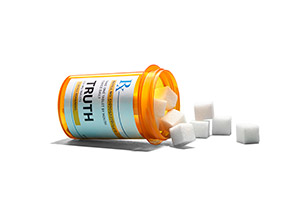5 Things Doctors Wish They Could Tell You
Doctors can't always be as blunt as they'd like, often because they don't want to overwhelm or embarrass their patients. We gave five MDs permission to stop sugarcoating—and divulge the advice they wish they could just blurt out.

Photo: Mauricio Alejo
Your job is killing you.
"It's hard to tell a patient she needs to find a new job, especially in this economy. But stress can have serious cardiovascular consequences. I recently had a patient with palpitations, so I had her wear a device to monitor her heart. One day I noticed a potentially life-threatening arrhythmia and called her immediately: She told me her boss had just asked her to work harder than she was already working. When I explained what that stress was doing to her health, she decided to change jobs—and a month later, felt so much better. The bottom line is, if you don't change the situation that's causing the stress, you're putting yourself at risk for stroke, heart attack, even sudden cardiac death."
—Annabelle Volgman, MD, medical director of Chicago's Rush Heart Center for Women
The sun is bad for you, period.
"Some people believe they look healthier with a tan, or that they need UV rays to get vitamin D, even though you can get enough D from diet and supplements. Ideally, I'd jump straight to telling patients—especially those who are at high risk for skin cancer—that they should avoid sun exposure as much as possible. But the fact is, many patients would ignore that advice. Behavioral adjustments take time. So I'll start by encouraging them to at least avoid the sun during peak hours, for example. Getting the full message across may take years, but it's so important: No one is immune to skin cancer. One in five Americans will develop the disease in their lifetime."
—Robert Kirsner, MD, chief of dermatology, University of Miami Hospital
Googling can be a total waste of time.
"I find that people are googling just about everything they see me for. If they get info from a good source, that's great. But there have been instances when a patient has read something on the Web about her condition and felt extremely worried and upset for a whole week before we had a chance to sit down and talk. It's frustrating; I'll dispel a myth and see a big sigh of relief. They say, 'Oh my gosh, I haven't slept in days.' And you think, 'I wish I could have been there when you read that.' I want patients to know that every person has a unique genetic makeup. One woman's diagnosis will certainly affect her differently than the same diagnosis affects someone else."
—Christopher Awtrey, MD, gynecologic oncologist, Boston's Beth Israel Deaconess Medical Center
Going off an antidepressant without guidance is truly nuts.
"Medication can change a person's life in a way that qualifies as miraculous. Then one day that person will come to see me suddenly depressed or anxious again because she just went off her meds, and I want to say, pardon my French, 'What the *%?! were you thinking?' First, there are the physical side effects of stopping a drug abruptly—from nausea to mood swings to electrical sensations in the body—which can be very uncomfortable and disquieting. Plus, the probability of relapse is much higher, especially if you haven't been taking the drug for very long. A relapse doesn't affect only you; most of us live in a complex matrix of people, and when we're ill, the impact on others is real."
—Philip Muskin, MD, professor of clinical psychiatry at New York–Presbyterian/Columbia University Medical Center
You need to care about your health as much as I do.
"Getting a woman to put herself first is a special challenge because we're often taught—explicitly or through societal influence—that kids, spouses, errands, etcetera, should take precedence. But if exercise and nutrition are at the bottom of your to-do list, you're never going to get to them. If I could really convince every patient that she had to make her health a priority, she might give herself permission to do it."
—Heather Burton, MD, assistant regional department chief, internal medicine, Colorado Permanente Medical Group
More Insider Health Secrets



